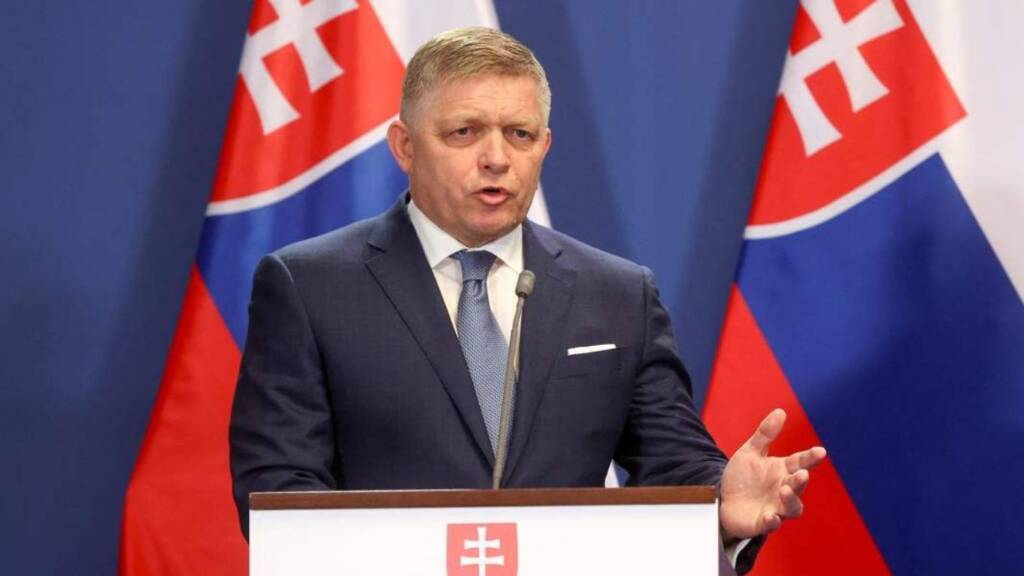The Euromaidan protests, which kicked off on 21 November 2013 in Kyiv’s Independence Square (Maidan Nezalezhnosti), marked a significant chapter in Ukraine’s recent history. Sparked by President Viktor Yanukovych’s sudden halt to an association agreement with the European Union, these gatherings quickly morphed into a civil chaos.
Despite facing violent crackdowns, protesters stood firm, leading to major political shifts. By February 2014, the relentless pressure forced President Yanukovych to flee the country, marking a turning point in Ukraine’s journey towards integration with western Europe.
Fast forward to recent times, and Slovakia seems to be pushed on the same path. We all remember how the likes of Victoria Nuland and deep state assets worked hard for the fall of the Ukrainian government, now allegations are afoot that the Deep state, is still attempting to engineer another battleground.
Fico Drops Bombshell
Slovak Prime Minister Robert Fico has alleged the presence of foreign operatives in the country, claiming they are experts in orchestrating coups and previously involved in Ukraine’s Maidan protests and political unrest in Georgia.
At a joint press conference with Hungarian Prime Minister Viktor Orban on Tuesday, Fico disclosed the information, citing a confidential report from Slovakia’s intelligence agency, the Slovak Information Service (SIS).
“There is a group of experts on the territory of the Slovak Republic that had actively operated in Georgia and during the Maidan in Ukraine,” Fico stated. He suggested that these individuals might be working to provoke similar political unrest in Slovakia and vowed to implement precautionary measures.
The Prime Minister added that the operatives are under “strict monitoring” and plans to raise the issue with Slovakia’s Security Council later this week. While the specific measures to counter these alleged threats have not been detailed, Fico stressed the need to act decisively to maintain constitutional order.
Opposition leaders and civic groups have dismissed the allegations, viewing them as an attempt to suppress dissent and distract from growing concerns over democratic backsliding under Fico’s administration.
But, what is ironic here is that in recent days, public protests have intensified since Fico’s return to power in 2023, with citizens expressing frustration over government policies and a perceived shift in Slovakia’s foreign relations.
Furthermore, Fico also survived an assassination attempt last year, much on the lines of the Ukraine saga. Following his electoral victory in 2023, Slovak Prime Minister Robert Fico has adopted policies that have strained relations with Ukraine and NATO.
Fico has consistently opposed military assistance to Ukraine, asserting that providing weapons only escalates the conflict. He has pledged to halt Slovakia’s military aid to Ukraine, stating, “We will not send a single bullet to Ukraine.”
Furthermore, Fico has declared his intent to veto Ukraine’s potential NATO membership, expressing concerns that such an expansion could lead to a broader conflict. He emphasized that as long as he remains in office, Ukraine will not be invited to join NATO.
These positions have caused friction within NATO, as Slovakia’s stance under Fico contrasts with the alliance’s collective support for Ukraine. His policies have also led to tensions with Ukraine, which views NATO membership as a strategic goal.
Also Read: EU dismantles Romania’s democracy, then blames Putin
His approach has aligned Slovakia more closely with Hungary, another NATO member expressing reservations about support for Ukraine, potentially challenging the alliance’s unity regarding the conflict. Just imagine, a population of 5.4 billion has suddenly caused panic in whole of western bloc and all because of one guy, Robert Fico.
Slovakia’s bold push to chart its own course—separate from the EU, NATO, and what some might call the US Deep State playbook—has clearly rattled the status quo. By advocating for a peaceful resolution to the Russia-Ukraine conflict, Fico has drawn both applause and ire. But with Slovakia now in the spotlight, instability seems to be creeping closer.
The so-called Deep State and European elites, who thrive on the continuation of conflict, are reportedly uneasy. Fico’s peace overtures have shifted the focus, and that’s a narrative they’d rather bury. Whether through political manoeuvring or external pressure, it seems there’s a growing interest in sidelining him before his message gains more traction.
